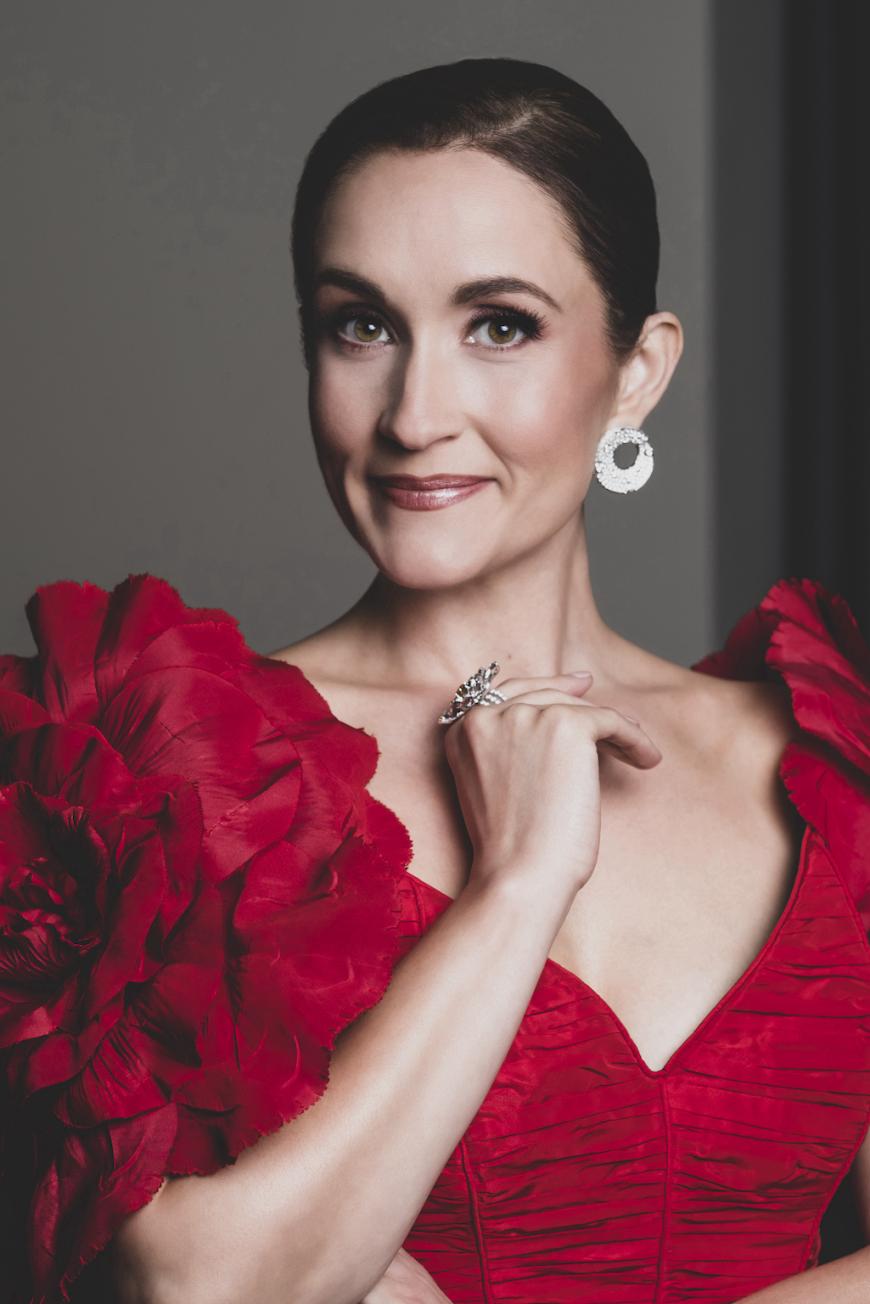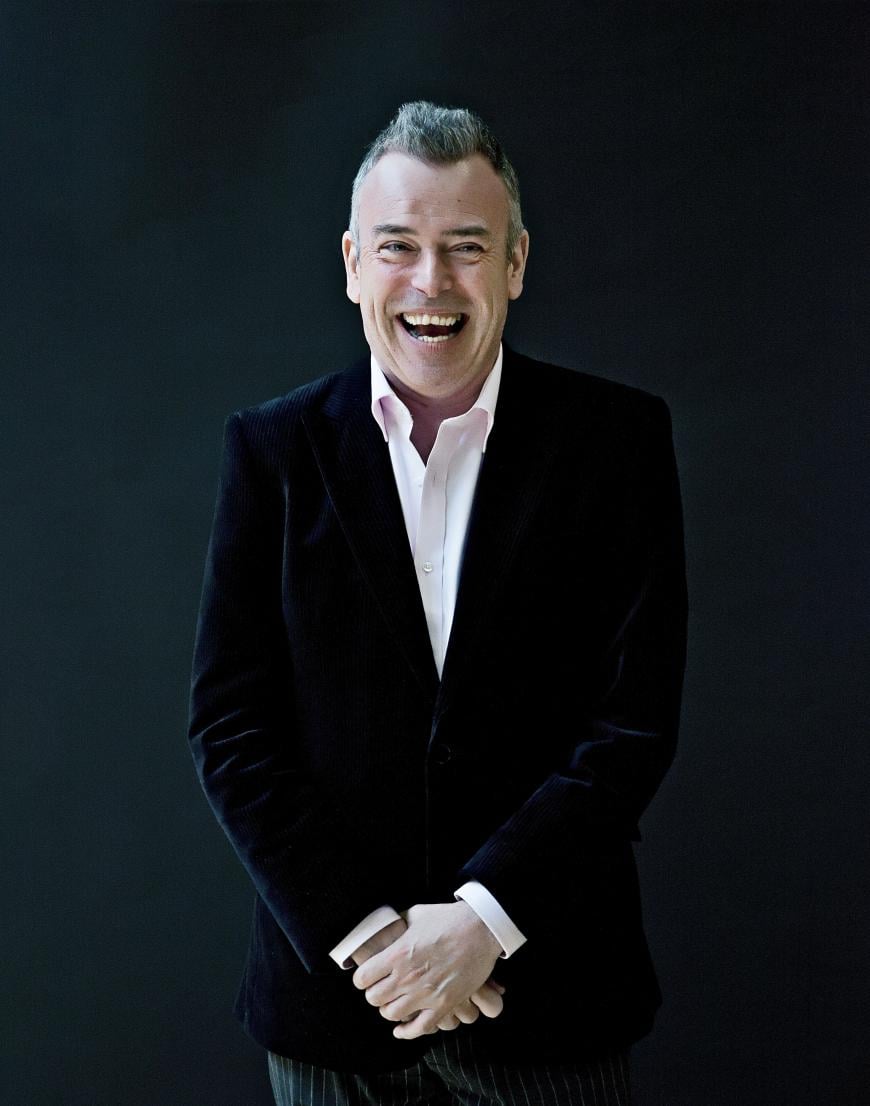
Back in April 2020, with the performing arts shut down because of the COVID-19 pandemic, the Metropolitan Opera put on what it called an “At-Home Gala,” in which dozens of stars appeared in songs and opera excerpts that they’d recorded at home. Among the most impressive and memorable performers was soprano Erin Morley, accompanying herself on the piano at a professional level while simultaneously singing a flashy aria by Gaetano Donizetti.
For her Cal Performances recital on Feb. 18, Morley didn’t have to accompany herself because her partner for the program was Malcolm Martineau, who is quite simply one of the best collaborative pianists in the business. Together, they made a splendid team and presented a marvelously varied program.
Morley built the program around gardens and the birds, trees, and butterflies that you find in them. In brief remarks to the audience, she said that the recital was dedicated to her mother, a master gardener, and mentioned how lucky she was to grow up around the beauty that her mother created. The theme carried over into Morley’s attire, a floor-length diaphanous gray gown decorated with appliqued flowers, leaves, and butterflies.

The program consisted of 16 songs, plus an encore, covering a 400-year period and five languages. This great variety is consistent with Morley’s operatic repertory, which includes everything from Handel to György Ligeti. In addition to tremendous technique and a beautiful, shimmering soprano, she brings deep musicality and a searching intelligence to everything she does.
She opened with four songs by the American composer Ricky Ian Gordon, chosen from the song cycle Huit Chansons de Fleurs, which Morley will premiere in full later this year. The selections set poems by Emily Dickinson, Dorothy Parker, Donald Hall, and Gordon himself.
These songs fully held their own artistically on a program that included earlier masters such as Claude Debussy, Richard Strauss, and Robert Schumann. The rippling piano of the Dickinson setting, “We Should Not Mind So Small a Flower,” seemed to invoke Debussy while still being wholly original.
Hall’s “Her Garden,” in which the protagonist tells of letting a garden that a deceased partner had designed and maintained grow wild, received a sober setting. Morley darkened her tone to match the sorrow of the poem and, even when singing quietly, articulated some of the words so that they had the impact of a tolling bell.
Parker’s poem, “One Perfect Rose,” starts romantically and then, typical of the author, ends with the protagonist wondering why no one ever gives her “one perfect limousine.” Morley injected exactly the right tone at the end, but the entire setting needed more irony or wit from Gordon.
Morley gave Georges Bizet’s “Ouvre ton coeur” (Open your heart) all the passion and charm it required and also reminded you that Bizet’s greatest work is set in Spain. Sergei Rachmaninoff’s gorgeous “Lilacs” was gorgeously sung, with astounding dynamic nuance within phrases. To Nikolai Rimsky-Korsakov’s melancholy “The Rose Enslaves the Nightingale,” Morley brought an infinite spectrum of vocal colors, darkening and lightening her tone and varying her vibrato.

The French settings that followed highlighted different aspects of the soprano’s artistry. Camille Saint-Saëns’s “Le rossignol et la rose” (The nightingale and the rose) is a pure vocalise sung on the syllable “ah,” and while it’s a real coloratura showpiece, it primarily showed off Morley’s precision and phrasing. And although the pianist has little to do, Martineau still made a musical impact far beyond the number of notes he had to play.
In the same composer’s “La libellule” (The dragonfly), Morley’s rhythmic sense came to the fore, and Claude Debussy’s “Les papillons” (Butterflies) was a sonic delight, bathing you in Morley’s shimmering tone and Martineau’s pearly pianism.
The German songs after intermission fared as well as the French. Particular highlights were a meltingly lyrical account of Schumann’s “Der Nussbaum” (The walnut tree) and Alexander Zemlinsky’s “Vöglein Schwermut” (The bird of melancholy). “Melancholy” doesn’t begin to describe this song, in which a little black bird is death’s messenger. Morley drained all light and warmth from her voice when the bird perches at midnight on death’s hand.
The last section of the program was six songs in English, one in Italian. Morley led with a restrained account of Thomas Morley’s setting of “It Was a Lover and His Lass” (from Shakespeare’s As You Like It), followed by John Woods Duke’s lovely “The Bird” and Roger Quilter’s somber “Weep You No More.”
Haydn Wood’s “Bird of Love Divine,” from 1910, is very much of its time, just this side of the music hall and yet full of charm. Of all the songs on the program, only “The Last Rose of Summer,” sung with more weight than it could bear, failed to delight.
The recital proper closed with a spectacular account of “Neath My Lattice,” from Arthur Sullivan’s operetta The Rose of Persia, full of challenging coloratura that Morley executed with aplomb and the kind of musicality that makes what could be a trifle sound like a grand masterpiece. As an encore — and the audience would happily have heard five — Morley and Martineau performed Ivor Novello’s “We’ll Gather Lilacs,” carrying the flower theme to the very end.




